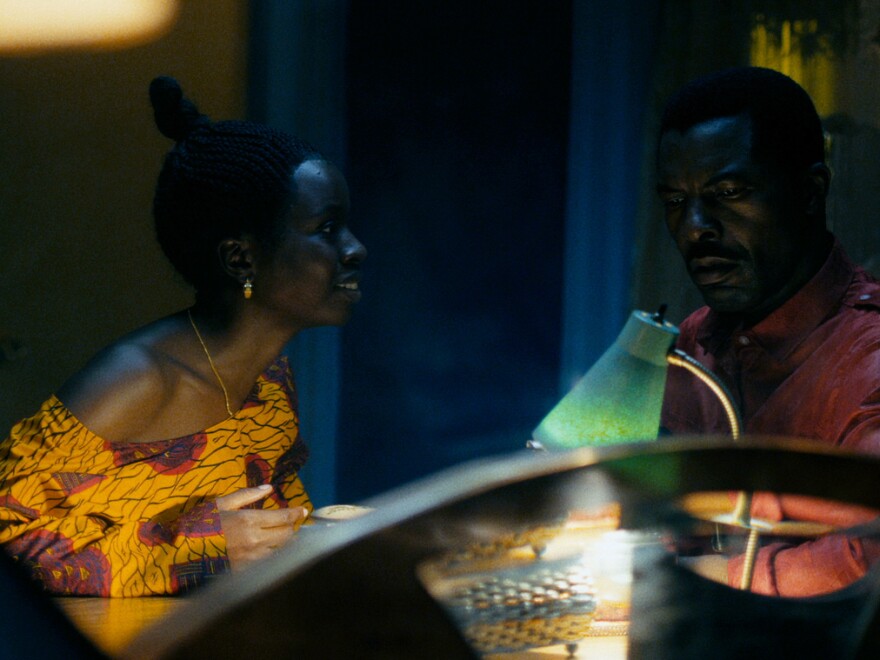From the start, Mother of George looks at its two protagonists, Adenike (Danai Gurira) and Ayodele (Isaach de Bankole), across distinct gender lines. The film opens at their traditional Yoruba wedding with two contrasted, tightly framed, straight-on shots of the groom and bride's parties.
Later, after the ceremonies, the differences between the two groups become more defined: We watch the women give Adenike child-rearing advice, while the men talk about how best to hide their infidelities.
That gender divide overlaps and partly fuels another tension — the one between the couple's native and adopted homes, their Nigerian and American cultures. But even as it seems to document one variety of immigrant experience, Mother of George also calls to mind the author Jhumpa Lahiri's recent dismissal of so-called "immigrant fiction" in The New York Times.
Just as Lahiri questioned the very premise of such a category — "If certain books are to be termed immigrant fiction, what do we call the rest?" she wondered — so does Mother of George, from American screenwriter Darci Picoult and Nigerian director Andrew Dosunmu, push back on the ghettoizing effect of such a label, carefully peeling back the different layers of its character's struggles.
True, much of the friction between Ayodele and Adenike does reflect an incompatibility between the rigid gender expectations of Nigerian tradition and the more fluid opportunities that Adenike's new home makes possible. When, after 18 months, Adenike still hasn't gotten pregnant, Ayodele chafes at the notion of her getting a job to help pay for a fertility specialist. (He, perhaps unsurprisingly, refuses to go to a doctor altogether, for fear that it will show he's the infertile one.)
Meanwhile, Ma Ayo (Bukky Ajayi) — whose very nickname, which means simply "Mother of Ayo(dele)," reflects a culture that describes women in terms of their relationship to their men — insists on having a grandchild, even if that means Ayodele must provide one with a different partner. And Ayodele's brother, Biyi (Tony Okungbowa), feels the need to keep hidden his relationship with Ayodele's best friend, for fear that her Western style of living won't be accepted by his family.
If the difficulties of cultural adaptation are never entirely dismissed in Mother of George, Dosunmu and Picoult do cast their characters' conflicts equally as cases of generational divide, the kind of familial strife that crosses national boundaries. Biyi and Ayodele's tortured responses to their plights, for example, result from an inability to reconcile their mother's demands with what they, in their better moments, seem to acknowledge is a more rational way to behave.

Likewise, while Dosunmu clearly relishes filming Adenike in her colorful Nigerian dresses, which imbue her with a kind of distancing majesty, his shots in the crowded Brooklyn streets also cast her as one of the masses, and her troubles as just another part of the modern New York landscape.
Mother of George's cinematography, for which it won an award at this year's Sundance Film Festival, is by and large one of its standout features. Dosunmu and cinematographer Bradford Young, whose work can also currently be appreciated in the sumptuous Ain't Them Bodies Saints, demonstrate a real eye for color and off-kilter shots, pushing their subjects to the far ends of the frame or pressing in on close-ups so that bodies spill generously off of the screen. It all combines to make a consistently striking visual experience — but in an unfortunate case of too-much-of-a-good-thing, the effect doesn't always serve the story.
Indeed, for all its virtuosity, the film's style can be a little alienating. Dosunmu, who often chooses to keep his takes running at length, many times leaves his characters deep in the background of the shot. Other times he films his character with some barrier — a screen, a window — between them and the camera. Both strategies keep the audience at an emotional and physical distance.
As a result, the film's stylistic elements — the magisterial images and the varied soundtrack, which veers from cheerful Nigerian songs to atonal orchestral pieces and even opera — sometimes distract from, rather than accentuate, its emotional impact.
It can seem like rather a weak protest to say that a film is too eye-catching, too arresting visually. Yet that's part of an inescapable feeling that lingers at the end of Mother of George: We want to get as close as possible to these characters, but for all its admirable elements, the film that frames them keeps us frustratingly aloof.
Copyright 2021 NPR. To see more, visit https://www.npr.org.


